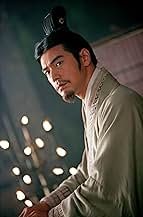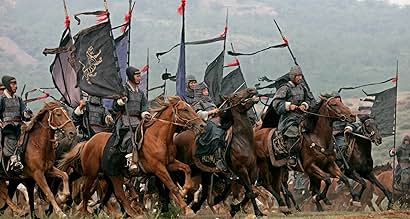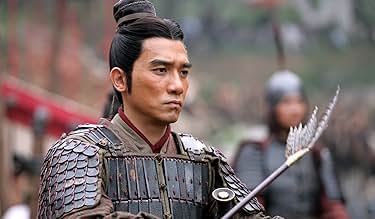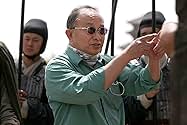NOTE IMDb
7,3/10
50 k
MA NOTE
Le premier chapitre d'une histoire en deux parties centrée sur une bataille combattue pendant la période chinoise des Trois Royaumes (220-280 apr. J.C.).Le premier chapitre d'une histoire en deux parties centrée sur une bataille combattue pendant la période chinoise des Trois Royaumes (220-280 apr. J.C.).Le premier chapitre d'une histoire en deux parties centrée sur une bataille combattue pendant la période chinoise des Trois Royaumes (220-280 apr. J.C.).
- Réalisation
- Scénario
- Casting principal
- Récompenses
- 14 victoires et 44 nominations au total
Tony Leung Chiu-wai
- Zhou Yu
- (as Tony Leung)
Shidô Nakamura
- Gan Xing
- (as Shidou Nakamura)
Baasanjav Mijid
- Guan Yu
- (as Ba Sen Zha Bu)
Avis à la une
The Battle of Red Cliffs holds a special place in Chinese history and mythology. It was a decisive conflict which occurred at the end of the Han Dynasty, immediately prior to the period of the Three Kingdoms, and it was fought in the winter of 208/209 between the allied forces of the southern warlords Liu Bei and Sun Quan and the numerically superior forces of the northern warlord Cao Cao.
The 2008 film, titled simply "Red Cliff", was deliberately timed for release in China in the lead up to the 2008 Summer Olympics and was a great success with Chinese audiences. One year later, the movie has a limited release in the West where the selling point is not so much the history (which is largely unknown outside China) as the director (Hong Kong's John Woo who is known for such Hollywood work as "Broken Arrow", "Face/Off" and "Mission: Impossible 2").
It has to be said that the Mandarin dialogue is leaden and much of the acting somewhat exaggerated, but a huge cast and considerable special effects - allied with the director's trademark style - makes the movie visually stunning with clever tactical manoeuvres, multiple battle scenes and considerable blood.
If it all seems a little confused to Western audiences, this is probably because we are seeing it in a rather different version to the original. In Asia, "Red Cliff" was released in two parts, totalling over four hours in length, whereas outside of Asia, the release is a single film of 'only' two and a half hours. For me, it's not up there with "Hero" or "House of Flying Daggers" but it is well-worth seeing and a pictorial treat.
The 2008 film, titled simply "Red Cliff", was deliberately timed for release in China in the lead up to the 2008 Summer Olympics and was a great success with Chinese audiences. One year later, the movie has a limited release in the West where the selling point is not so much the history (which is largely unknown outside China) as the director (Hong Kong's John Woo who is known for such Hollywood work as "Broken Arrow", "Face/Off" and "Mission: Impossible 2").
It has to be said that the Mandarin dialogue is leaden and much of the acting somewhat exaggerated, but a huge cast and considerable special effects - allied with the director's trademark style - makes the movie visually stunning with clever tactical manoeuvres, multiple battle scenes and considerable blood.
If it all seems a little confused to Western audiences, this is probably because we are seeing it in a rather different version to the original. In Asia, "Red Cliff" was released in two parts, totalling over four hours in length, whereas outside of Asia, the release is a single film of 'only' two and a half hours. For me, it's not up there with "Hero" or "House of Flying Daggers" but it is well-worth seeing and a pictorial treat.
In 208 A.D., in the Han Dinasty of China, the tyrannic and greedy Prime Minster Cao Cao (Fengyi Zhang) forces the reluctant Emperor Han to declare war against the kingdoms of Liu Bei (Yong You) and Sun Quan (Chen Chang) in the South of China. Cao Cao heads with a mighty army of one million soldiers and attacks Liu Bei. His adviser and war strategist Zhuge Liang (Takeshi Kaneshiro) heads to South in a diplomatic mission trying to convince Sun Quan to join force with Liu Bei against the powerful warlord. When Zhuge Liang meets the viceroy Zhou Yu (Tony Leung), he succeeds in his assignment with the alliance of the two kingdoms against Cao Cao. The armies fight against each other in many battles until the final one in Red Cliff where guile, knowledge and strategy prevail.
"Chi Bi" is visually spectacular with magnificent cinematography, art direction, set decoration and costumes. The story is based on a true milestone in the Han Dinasty in China and the screenplay is engaging, using lessons of "The Art of the War". Once again John Woo makes a fantastic work and I am looking forward to see the sequel of this stunning film on DVD that has not been released in Brazil yet. My vote is eight.
Title (Brazil): "A Batalha dos 3 Reinos" ("The Battle of the 3 Kingdoms")
"Chi Bi" is visually spectacular with magnificent cinematography, art direction, set decoration and costumes. The story is based on a true milestone in the Han Dinasty in China and the screenplay is engaging, using lessons of "The Art of the War". Once again John Woo makes a fantastic work and I am looking forward to see the sequel of this stunning film on DVD that has not been released in Brazil yet. My vote is eight.
Title (Brazil): "A Batalha dos 3 Reinos" ("The Battle of the 3 Kingdoms")
This review is of the Chinese DVD Release of the 1st film only... I cannot understand how the previous poster could feel that way about this gorgeous epic. Everything they said they hated were things I thought were well done, and wonderful about the film. Of all the people I've shared this DVD with, they've all thought it was an amazing movie also.
Ever camera shot was gorgeous. The angles were unique, without wasted punch-ins or b-roll. It's rare to find films so tastefully shot. The color was stunning, and the interpretation of the classic tale was unique and never disappointing.
Meanwhile, With all the characters, the actors each held such a powerful presence. It's very tough to develop any character singularly while you have so many important characters with their own mythos and chronicles, but each actor really held up to their image and that of the character. Kaneshiro is a very unique version of Zhuge which caught me off guard at first, but appreciated after his scene w/ the Zhou Yu. Zhou Yu was never a character I've cared for, but here, he's likable and strong. The best "fresh" interpretation though was that of Guan Yu. Instead of being "just another" honourable and strong warrior, he's rather a warrior-scholar, more intelligent, and more personality than ever before.
My only true quarrel is that it ends prematurely (that is, until we see the 2nd half in 2009). I just wish they could have done the whole saga instead of this little piece.
Thank you John Woo for one of the finest Three Kingdom movies ever! I believe this is a great direction for your talents! You've woven the action you're so famous for with a deep, heartfelt classic tale! Wonderful job!
Ever camera shot was gorgeous. The angles were unique, without wasted punch-ins or b-roll. It's rare to find films so tastefully shot. The color was stunning, and the interpretation of the classic tale was unique and never disappointing.
Meanwhile, With all the characters, the actors each held such a powerful presence. It's very tough to develop any character singularly while you have so many important characters with their own mythos and chronicles, but each actor really held up to their image and that of the character. Kaneshiro is a very unique version of Zhuge which caught me off guard at first, but appreciated after his scene w/ the Zhou Yu. Zhou Yu was never a character I've cared for, but here, he's likable and strong. The best "fresh" interpretation though was that of Guan Yu. Instead of being "just another" honourable and strong warrior, he's rather a warrior-scholar, more intelligent, and more personality than ever before.
My only true quarrel is that it ends prematurely (that is, until we see the 2nd half in 2009). I just wish they could have done the whole saga instead of this little piece.
Thank you John Woo for one of the finest Three Kingdom movies ever! I believe this is a great direction for your talents! You've woven the action you're so famous for with a deep, heartfelt classic tale! Wonderful job!
Admittedly, I had my doubts about Red Cliff. John Woo in the chair to make a historical war drama? That hasn't happened since... oh wait, it's never happened before. Then again, if Ang Lee could make a great movie about gay cowboys, I'm willing to see what John Woo can do outside his usual territory. That, and the film's steady high profile publicity over the past several years, made Red Cliff a must-see for me.
For Red Cliff, the biggest divergence from Woo's prime time classics such as The Killer is the subdued emotions. Most of Woo's classics were rather in-your-face in terms of melodrama, but not so in Red Cliff. While I loved his melodramas, I believe Red Cliff reveals a matured Woo with improved craftsmanship. Make no mistake: he has incorporated his signature themes of male bonding, loyalty, and sacrifice in Red Cliff--but in a much more subtle and understated manner.
Unquestionable, some viewers have loved Woo for his badass action sequences. But for me, I've always been a fan because of his memorable characters. To this point, I was pleased with Red Cliff's strong characters. The film has focused on making the central figures appealing by either embellishing them with an edgy factor or giving them some depth, and this is successful for the most part.
For me, the low point of the movie was the weak acting from Zhao Wei and Takeshi Kaneshiro -- not just compared to Tony Leung, but on any scale. Kaneshiro is an odd choice to play the historically glorified Zhuge Liang, while Zhao Wei's character seemed totally inconsequential.
The film also features some annoying cartoonish music, which seemed to be oddly misplaced in intense combat scenes.
Other than those few shortcomings, Red Cliff is a solid film that is both a mega blockbuster and quality film-making.
For Red Cliff, the biggest divergence from Woo's prime time classics such as The Killer is the subdued emotions. Most of Woo's classics were rather in-your-face in terms of melodrama, but not so in Red Cliff. While I loved his melodramas, I believe Red Cliff reveals a matured Woo with improved craftsmanship. Make no mistake: he has incorporated his signature themes of male bonding, loyalty, and sacrifice in Red Cliff--but in a much more subtle and understated manner.
Unquestionable, some viewers have loved Woo for his badass action sequences. But for me, I've always been a fan because of his memorable characters. To this point, I was pleased with Red Cliff's strong characters. The film has focused on making the central figures appealing by either embellishing them with an edgy factor or giving them some depth, and this is successful for the most part.
For me, the low point of the movie was the weak acting from Zhao Wei and Takeshi Kaneshiro -- not just compared to Tony Leung, but on any scale. Kaneshiro is an odd choice to play the historically glorified Zhuge Liang, while Zhao Wei's character seemed totally inconsequential.
The film also features some annoying cartoonish music, which seemed to be oddly misplaced in intense combat scenes.
Other than those few shortcomings, Red Cliff is a solid film that is both a mega blockbuster and quality film-making.
After 15 years in Hollywood and making only on decent film (Face/Off) John Woo returns to his Asian roots. Here he get the creative independence he deserves and creates the most successful (and most expensive) ever Chinese films.
The year was 208AD, the Prime Minister Cao Cao (Fengyi Zhang) has taken control of Northern China and made the Emperor a puppet ruler. But the south is defiance. Lord Liu Bei (Yong You) tries to fight and has excellent general, but is hopelessly outnumbered by Cao Cao forces. He sets out to make an alliance with two other Southern Lords, the young Sun Quan (Chen Chang) and military expert Zhou Yu (Tony Leung). Liu Bei uses his chief adviser Kongming (Takeshi Kaneshiro) to negotiate with Lords. Even with this new alliance, Cao Cao still outnumbers the 3 Kingdoms with a force of 800,000 troops. Zhou Yu and Kongming sets out the win the coming battle with strategy, expert military tactics, trickery, the weather and spies. Here the two forces set out for the coming battle.
John Woo is an action director and the martial arts and the battles are well handle, if OTT (but that's what John Woo does). He has flair and the fights are bloody. He has fun with the CGI, from the battles to following arrows and doves when they are in flight. He gets to combine both Asian and Hollywood style of film-making. The music as well combine both Asian and Western styles. The film itself feels like the Chinese Lord of the Rings.
Tony Leung is the strongest link in the film, he is an expert martial artist and a good actor, being in House of Flying Daggers, the Infernal Affiars Trilogy and Lust Caution just to name a few. He offers another good performances. Other actors also offer good performances and they was no one who dragged the film down.
In China and Hong Kong Red Cliff was split into two films and already out on DVD in Hong Kong. The Western version combines the films, and its also the dumbed down version. The English was just weird in context with the rest of film. The film also does change in tone from it beginning. Lets hope that the DVD release in the West will be of both films or an extended edition.
The year was 208AD, the Prime Minister Cao Cao (Fengyi Zhang) has taken control of Northern China and made the Emperor a puppet ruler. But the south is defiance. Lord Liu Bei (Yong You) tries to fight and has excellent general, but is hopelessly outnumbered by Cao Cao forces. He sets out to make an alliance with two other Southern Lords, the young Sun Quan (Chen Chang) and military expert Zhou Yu (Tony Leung). Liu Bei uses his chief adviser Kongming (Takeshi Kaneshiro) to negotiate with Lords. Even with this new alliance, Cao Cao still outnumbers the 3 Kingdoms with a force of 800,000 troops. Zhou Yu and Kongming sets out the win the coming battle with strategy, expert military tactics, trickery, the weather and spies. Here the two forces set out for the coming battle.
John Woo is an action director and the martial arts and the battles are well handle, if OTT (but that's what John Woo does). He has flair and the fights are bloody. He has fun with the CGI, from the battles to following arrows and doves when they are in flight. He gets to combine both Asian and Hollywood style of film-making. The music as well combine both Asian and Western styles. The film itself feels like the Chinese Lord of the Rings.
Tony Leung is the strongest link in the film, he is an expert martial artist and a good actor, being in House of Flying Daggers, the Infernal Affiars Trilogy and Lust Caution just to name a few. He offers another good performances. Other actors also offer good performances and they was no one who dragged the film down.
In China and Hong Kong Red Cliff was split into two films and already out on DVD in Hong Kong. The Western version combines the films, and its also the dumbed down version. The English was just weird in context with the rest of film. The film also does change in tone from it beginning. Lets hope that the DVD release in the West will be of both films or an extended edition.
Histoire
Le saviez-vous
- AnecdotesThis movie had been divided in two parts for the theatrical release in the Asian market. The American release will be the condensed version of these two parts. The reason given was that the Asian viewers are more familiar with the characters and their exploits while the western viewers might be confused with the numerous characters and their similar names (therefore keeping it simple for the US market).
- GaffesAt 1:56:56, after the first battle, there is a shot from a low angle where you can see the generals sitting on their horses, showing the soles of their shoes. You can clearly see that their shoes have sneaker soles.
- Citations
Zhuge Liang: We must fight even if we cannot win.
- Versions alternativesFor the UK theatrical release, cuts were required to remove a shot of a cruel and dangerous horse fall (a horse being tripped and falling forward, rolling over on its neck). The cuts were required in accordance with the Cinematograph Films (Animals) Act 1937.
- ConnexionsFeatured in The Rotten Tomatoes Show: Zombieland/A Serious Man/Whip It (2009)
Meilleurs choix
Connectez-vous pour évaluer et suivre la liste de favoris afin de recevoir des recommandations personnalisées
Détails
- Date de sortie
- Pays d’origine
- Sites officiels
- Langue
- Aussi connu sous le nom de
- Les trois royaumes
- Lieux de tournage
- Sociétés de production
- Voir plus de crédits d'entreprise sur IMDbPro
Box-office
- Budget
- 553 632 000 CNY (estimé)
- Montant brut aux États-Unis et au Canada
- 627 047 $US
- Week-end de sortie aux États-Unis et au Canada
- 13 104 $US
- 22 nov. 2009
- Montant brut mondial
- 129 710 514 $US
- Durée2 heures 25 minutes
- Couleur
- Mixage
- Rapport de forme
- 2.39 : 1
Contribuer à cette page
Suggérer une modification ou ajouter du contenu manquant

Lacune principale
What was the official certification given to Les 3 royaumes (2008) in France?
Répondre


































